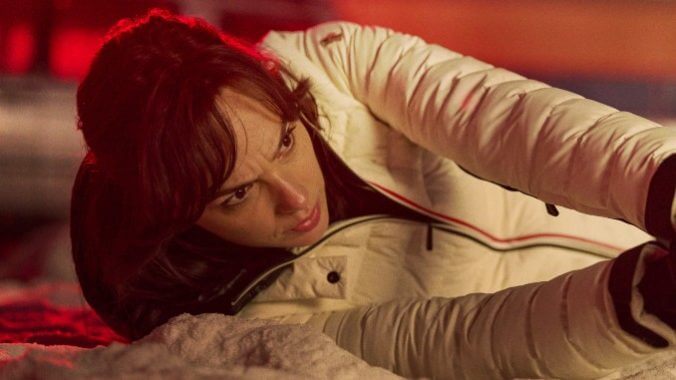Heart of Stone Proves Netflix Can’t Tell the Difference between Real Movies and Fake Movies

If you’ve ever avoided an autoplaying movie long enough to actually browse a streaming service, you’ve run into knock-offs from The Asylum. The studio behind Sharknado, The Asylum’s main business is producing mockbusters—generic, store-brand movies titled and designed to trick your grandma into picking The Terminators instead of The Terminator. (In this scenario, your grandma rules.) While mockbusters are low-budget, slapdash moneygrabs, they are completely different than Heart of Stone, which falls into a far trickier category. The would-be action franchise-starter from Netflix is what I’d call a Fake Movie—two hours that have an uncanny resemblance to cinema, but upon closer inspection, are more akin to a business proposal. Its characters are chosen to be inoffensive and replicable. Its plot is a motor, fueled by buzzwords. Its purpose is to procreate, or if that fails, to permanently hold space in libraries where Real Movies once charged fees. It is born of board meetings, of powerful men in puffy vests asking why their investment of choice doesn’t have its own Mission: Impossible yet.
Aside from the staples—the diversified cast still starring two white people, the flattened globetrotting, the tech-based plot device—Heart of Stone’s proposal is “Can we make Gal Gadot an action hero this time?” Gadot plays Rachel Stone AKA Nine of Hearts, a super-spy working for a mysterious organization known as The Charter, embedded undercover with the boring normal spies in MI6. Her MI6 squad of Parker (Jamie Dornan), Bailey (Paul Ready) and Yang (Jing Lusi) have a fake “Welcome to Applebee’s!” cheer and an ill-defined purpose. Nobody has chemistry with each other, just like the different animatronics on amusement park rides can’t be said to have chemistry with each other.
Stone’s got her own mission, and goes after her team’s targeted baddie—Indian hacker Keya Dhawan (Alia Bhatt)—on a parallel course. The thing she’s got over these other spies is that she’s tapped into The Charter’s secret weapon: The Heart, an all-seeing prediction model that can run the numbers and crank out the best possible choice for any situation. All a capable spy would need, then, is someone to tell them where The Heart is guiding them, and they’ll never fail. Remember how cool it was when Han Solo told C-3PO to never tell him the odds? Well, now C-3PO is in charge of a spy movie. Hooray.
An uncomfortable irony smothers Heart of Stone as soon as you learn that an omniscient, surveillance-state algorithm is making life-and-death decisions. It’s an icky reminder of how Netflix actually does business (giving notes to creatives based on data they collect about how people watch their movies and shows) and of how an infatuated Hollywood still thinks computers are magic—or at least thinks that we think that.
This manifests in the movie as Stone, remotely connected to The Heart, seeing the world through a video game’s HUD: POV shots are decorated with useless digital lines, spinning dials measuring nothing, brackets around people (perhaps to scan and use later as unpaid extras), and a glowing green line telling her which path leads to success. It’s all conducted by Jack of Hearts (Matthias Schweighöfer), miming tired Minority Report gestures at floating, intangible computer nonsense. Nomad (Sophie Okonedo), their leader, joins him from time to time in their little laser tag lobby hideout, her hardass demeanor covered by lightshow grids. The only thing missing is geometric carpet and a cheesy instructional video.
But at least ‘90s arcades had an aesthetic. Heart of Stone is murky, drab and always going the wrong speed. It’s either motionless, allowing exposition scene after exposition scene to lay out the boring details of what might happen if the wrong folks get control of The Heart, or erratic, dicing its badly remixed action sequences like it was trying to avoid a copyright strike from the movies it steals from. Director of British TV and films like The Woman in Black sequel, Tom Harper brings Greg Rucka and Allison Schroeder’s script to life with the same sense of action, tension and humanity as a TI-86 graphing calculator. Robotically accrued setpieces familiar to anyone who’s seen an action movie (specifically a Mission: Impossible movie) in the last few decades tumble after each other gracelessly.
Car chases down foreign city streets crash into death-defying free-falls where mid-air fistfights vie for a parachute. They’re shot from unappealing, ugly angles (like out through the windshield, or from slanted, dark corners) and have no sense of physical reality. When a chunky utility van flees motorcycles and sedans down staircases and alleyways, there’s no sense of weight or scale between the vehicles; parachutes and wingsuits glide through the air like cartoon UFOs. Harper’s better with motorcycles; an Iceland highway chase, though the briefest of the bunch, at least conveys speed and tactility thanks to a blend of shots focused on wide-open space and tightly cramped quarters.
-

-

-

-

-

-

-

-

-

-

-

-

-

-

-

-

-

-

-

-

-

-

-

-

-

-

-

-

-

-

-

-

-

-

-

-

-

-

-

-








































